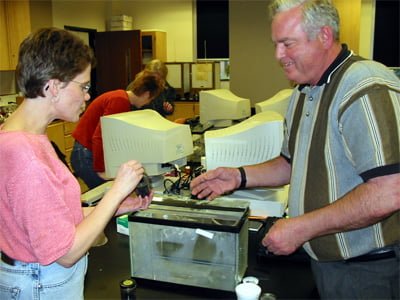Uncovering fingerprints, collecting blood samples, analyzing DNA evidence – Guilford students can now learn to become better detectives. Guilford became the first college or university in North Carolina to offer a forensics major when the faculty gave approval on Feb. 27. It is one of only 13 forensics majors nationwide, according to Dr. Frank Keegan, biology professor and architect of the new major.
“Forensics is using science to figure out what happened at a crime scene,” Keegan said.
Previously, forensics was only offered as a concentration, but Keegan said student requests prompted its expansion into a major. CCE students ranked forensics as the most-desired new major in recent surveys, so all of the required courses can be completed in the evening hours.
“My phone has been ringing off the hook since there is now so much interest in forensics,” said Keegan.
Keegan attributes this to many factors – the introduction of DNA evidence in court cases, a “quantum leap” in technology, television shows about the subject and popular crime books by novelists such as Patricia Cornwell.
“Biological sciences advance quickly, and the rapid technological enhancements in forensics excite the imagination,” Keegan said.
Keegan, who currently teaches Fast Track II Forensics Chemistry, had to revamp his curriculum to catch up to the technological and scientific advancements since the last time he taught the course, only two years ago.
Job opportunities in forensics are numerous, with many of them having above-average starting salaries. Possible careers include toxicologists, lab technicians, crime lab serologists, autopsy and firearms technicians, and DNA analysts.
Lisa Pegram, a CCE junior, decided to major in forensics because she hopes to work in a local crime lab.
“I want to be out in the field working hands-on with criminal investigations,” Pegram said. “This will give me the experience a Criminal Justice major wouldn’t.”
The eight required courses are: General Zoology, General Botany, Introduction to Forensic Science, Forensic Chemistry, Cell Biology, Human Anatomy and Physiology I and II, and Forensic Anthropology.

